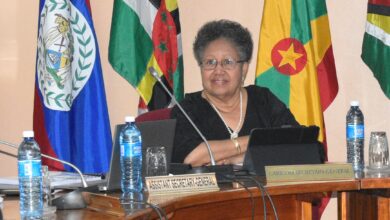CHRIST CHURCH, BARBADOS – “The decision of the EU to proceed with such a hefty price cut is outrageous and unconscionable, and as though to add insult to injury EU beet sugar producers will now receive compensation covering 64.2% (inclusive of an additional €2.2 billion) of the loss incurred by the price cut. In contrast, a meagre €40 million has been offered to ACP sugar producers as compensation.” This was the reaction of Guyana’s Minister of Foreign Trade and CARICOM Ministerial Spokesperson on Sugar Hon. Clement Rohee to yesterday’s decision by the EU to move ahead with a 36 percent price cut in respect of its sugar regime. A decision was also taken to extend the transition period from two to four years. The Caribbean has reacted with dismay to the announcement, as it puts at risk the livelihoods of tens of thousands of farmers and their families across the Region, as the centuries old Caribbean sugar industry faces an uncertain future, with export earnings now at risk of being undercut. More so, the decision is a betrayal of the long-standing relationship between Europe and the Caribbean, in respect of a key commodity export. While the EU has said the decision would strengthen its position at the forthcoming Sixth World Trade Organization (WTO) Ministerial Meeting in Hong Kong, it has weakened the EU’s standing amongst the world’s smallest and most vulnerable countries. This latest action by the EU in response to pressures of liberalization under the WTO has forced the Caribbean to question whether rich countries and the multilateral trading system have any empathy for their trade and development concerns. At a time when a Development Round is being negotiated under the WTO, the decision is a bitter blow, in that the interests of the small and vulnerable are not being taken into account. The implications of the decision for Least Developed Countries (LDCs) are also sobering, again raising doubts about the sincerity of rich countries in helping advance the development of poor nations, during what supposedly are global trade talks centred on development. Reportedly, there are provisions in the deal for Europe to restrict imports from LDCs, if they increase by more than 25 percent each year. The decision is particularly hard for the Africa, Caribbean and Pacific (ACP) Group to fathom, as certain EU member states were offered an additional €2.2 billion to a package that had already committed to over €5 billion, while in stark contrast a paltry €40 million in accompanying measures has been earmarked to be shared amongst the eighteen ACP sugar supplying countries. “It seems that the Commission has got its way by throwing extra billions in compensation at European farmers and industry. The ACP are left with a draconian price cut and a paltry €40 million in assistance to share. [The ACP are] by far the biggest losers in this reform,” said Ambassador George Bullen, Chairman of the ACP Consultative Group on Sugar and Ambassador of the Eastern Caribbean States to Brussels. Chief Executive Officer of the Sugar Association of the Caribbean Dr. Ian McDonald characterized the deal reached yesterday as an outrage. The sugar executive lamented that the ACP was not allowed to participate in discussions of a “life and death nature for its sugar farmers.” Dr. McDonald charged that the decision was a “betrayal of the Cotonou Partnership Agreement, which advances the notion of safeguarding the benefits of the Sugar Protocol. The decision harshly discriminates against small, vulnerable ACP sugar supplying countries and European sugar supplying countries, given the pittance of a package – the €40 million – allocated for the ACP. The decision clearly runs counter to the EU’s call for poverty alleviation and in that vein supporting the Millennium Development Goals in poor countries.” In the coming weeks, the ACP sugar group will impress on the EU and more particularly on the Commission to deliver on their promises, with concrete proposals on specific resources to be made available upfront to enable the ACP to adapt to the reform. “Without timely and adequate assistance, our industries are doomed, our economies in turmoil, and the socio-economic fabric of our countries in tatters,” added Ambassador Bullen. This latest action by the EU has strengthened the resolve of the Caribbean to work to influence the outcome of the Hong Kong Ministerial, to ensure that the development dimension of the Doha Round is put in focus and irrevocably entrenched in any future mandate. “The EU cannot expect to progress at Hong Kong at the expense of the ACP,” Ambassador Bullen cautioned. At the 2005 Commonwealth Heads of Government Meeting (CHOGM) currently underway in Malta, Caribbean Heads are signalling that preferential access to markets in the European Union for Bananas and Sugar will be an important plank for the Region’s positions at the Hong Kong Ministerial. “Long-standing preferences constitute a vital concern for the ACP as a whole, and the Caribbean has supported the Group’s position to not join any consensus decision on Agriculture [in WTO talks] unless the erosion of preferences is effectively addressed, through concrete and meaningful measures to mitigate the impact of reform on the preference receiving countries. Failure to do so would impose a disproportionate share of the costs of reform on some of the poorest and more vulnerable Members of the WTO,” Minister Rohee underscored.
News Letter
Subscribe to our mailing list to get the new updates!
Check Also
Close
-
Facilitating Intra-Regional Agri-Food Trade
October 10, 2018





